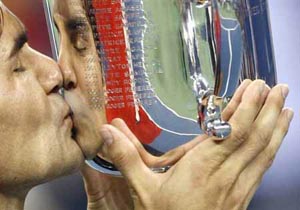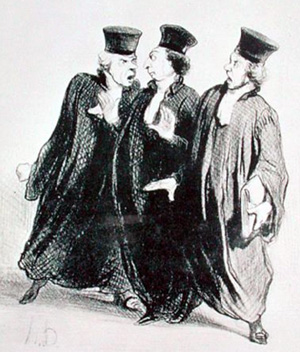 |
Organic Society
Admiration, Foundation for the
Reign of Mary
Plinio Corrêa de Oliveira
A truly Catholic person has an enormous appetite for admiration. His joy is not to be admired, but to admire. When he sees someone or something that is more eminent than he is or has more significance, he becomes extremely content and gives thanks to God. When a person is like this, an extraordinary equilibrium, harmony and acute objectivity enter his soul.
If someone were to ask me: “What should I do to become more intelligent?” I would reply: First, each one of us has the amount of intelligence God gave us when He created us, and this cannot change.

Unfortunately, admiration without self-interest is a rare attitude today |
But, second, our intelligences must be developed, and in this regard we can improve them a great deal. Then, in order to increase your intelligence, I offer you advice that comes from my own experience - not because I am pretending to be more or less intelligent than others, but because I am older and observed more on this matter.
When a man does not like to admire, but prefers to have the admiration of others for himself, he ends by becoming a slave of the admiration of others. He acquires a horror of doing anything that does not earn him the applause of others because he becomes very insecure. This man is actually a sick person. He is like one who cannot walk without having someone supporting him; his legs are weak and his steps become insecure. He is sick because of his weak legs.
So also is the man who needs the applause of his audience for every action he undertakes. Without it, he cannot stand firm in his position. His spirit does not work well.
Since this man is centered on himself, he does not see the reality objectively as it is, but only insofar as it facilitates the cult of his own ego.
On the other hand, if a man is unconcerned about receiving the admiration of others but disinterestedly admires the external world, his lucidity, objectivity and, consequently, his serenity all increase.

Often tourists visit Notre Dame without the spirit of admiration |
Let me give you an example. When we go to Europe we see those hordes of tourists passing through all the interesting attractions, such as: St. Peter’s Basilica or the Cathedral of Notre Dame, to mention only two.
Many persons go to Europe just because such travels make them appear well before their friends. Or perhaps a man was under stress and needed some trip to relax. He had to choose between going fishing inland with friends or a trip to Europe. At the last moment, his wife decided to accompany him and, since she does not like fishing the couple ended by calling a tourist agency and landed in Europe.
When such persons travel in Europe, they usually do not admire. They simply take that opportunity to compare what they see in Paris or Rome with their own cities or countries. Thus we see groups of tourists laughing and joking with each other as they visit the various monuments and places of interest. Actually, their laugh is an expression of their scorn for those monuments, either because they believe their own attractions at home are better or because they are resentful, humiliated by the superiority of Europe. So they retaliate by making a joke to put it down. These people do not have an objective picture of Europe.
Another type of people go there to admire and fill their souls with those European marvels of the past. This state of spirit does not mean that the person necessarily closes his eyes to the shortcomings of Europe. The admiring person sees them, but knows how to prevent those defects from obscuring the good things of the past. When they return home, they have a much more lucid and objective picture of Europe than others. Since they were not concerned about themselves or their own interests, they were able to see reality as it is.
Therefore, we should thirst to admire. If we find a quality or gift in our colleagues that is more than what we have, we should be glad and comment on it with other friends: “Today I realized that X is more intelligent than I. He did this and said that and expounded his idea in this way. I am very happy to realize what a brilliant colleague we have!”

Backbiting and criticism is more common among colleagues |
But, unfortunately, phrases like this are rarely heard today because human nature has a distaste for admiration. Thus modern man reveals himself to be unwise; he loses the best part of life, which is fruit of admiration. Man should live in order to admire.
More commonly we hear the exact opposite today. When a colleague of the same age or even younger or from a lower social level says something that would have taken us ten years to formulate, instead of praise, a criticism is made: “That man is unbearably proud!”
Why proud? Just because he said something that I could not have said? For me, he is an example, a gift of God. It is a gift to know a man who is more intelligent than I - he elevates my intelligence. I should thank God for the gift of seeing reality through his more acute eyes. I should admire and respect him.
I will go a little further in my analysis. A man gifted with a great capacity for admiration is happier and more perfect than a man gifted with a great capacity for doing things. This difference sets the pattern for the Counter-Revolution.
This spirit of admiration is the foundation of the Reign of Mary. It is composed of love for our equals and our superiors and for the whole hierarchy of society. We should pay our superiors the tribute of respect and admiration. The admiring soul willingly pays this homage, and, after doing so, it is joyful. This is the counter-revolutionary spirit.
The opposite of this spirit is to be jealous and envious, to cry out Liberté, égualité, fraternitéor its equivalent, non serviam, the motto of Satan.

Posted July 9, 2012

  | | Prof. Plinio |
Organic Society was a theme dear to the late Prof. Plinio Corrêa de Oliveira. He addressed this topic on countless occasions during his life - at times in lectures for the formation of his disciples, at times in meetings with friends who gathered to study the social aspects and history of Christendom, at times just in passing.
Atila S. Guimarães selected excerpts of these lectures and conversations from the transcripts of tapes and his own personal notes. He translated and adapted them into articles for the TIA website. In these texts fidelity to the original ideas and words is kept as much as possible.

Related Topics of Interest
 The Role of Admiration and Affection in the Family The Role of Admiration and Affection in the Family
 An Élan for Perfection Should Exist in All Classes An Élan for Perfection Should Exist in All Classes
 The State of Mind that Generated the Revolution The State of Mind that Generated the Revolution
 Two Opposed Poles of Society: Prestige and Money Two Opposed Poles of Society: Prestige and Money
 Egalitarianism and Vulgarity Egalitarianism and Vulgarity
 An Australian Coach for the Queen An Australian Coach for the Queen
 The Peasant-Nobles of the Roncal Valley The Peasant-Nobles of the Roncal Valley
 The Tribute of the Three Cows The Tribute of the Three Cows

Related Works of Interest
|
|
Organic
Society |
Social-Political | Home |
Books | CDs |
Search | Contact Us |
Donate

© 2002-
Tradition in Action, Inc. All Rights Reserved
|
 |
|